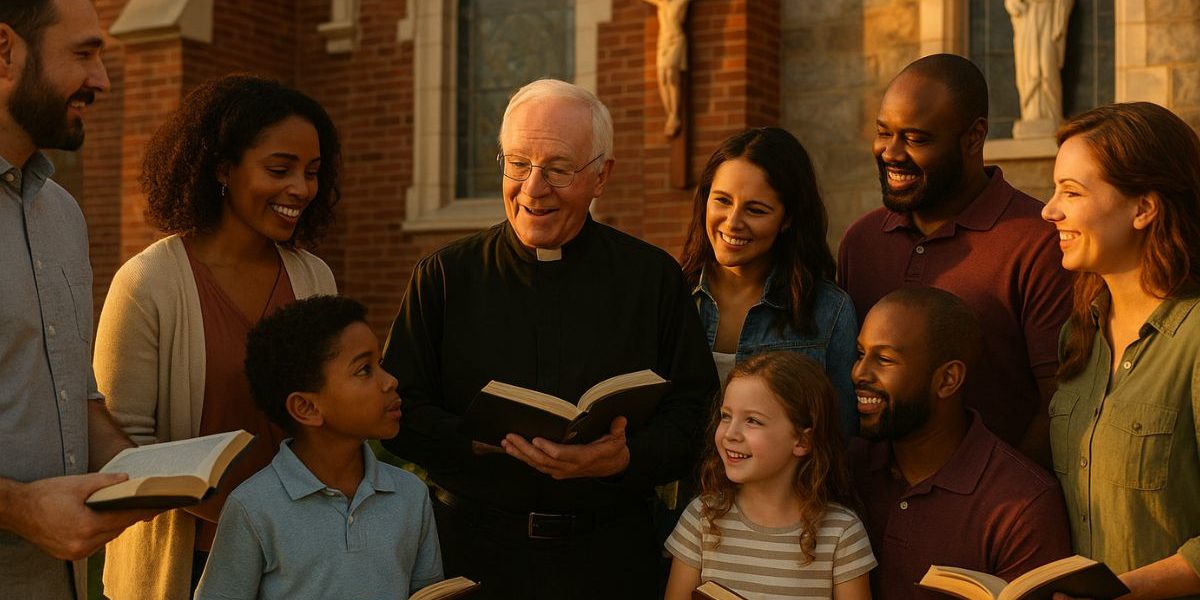The story of the Church is filled with people, places, and practices that have shaped faith for centuries. From early martyrs to present-day ministries, every generation adds something meaningful. Testing our knowledge of Church history and traditions isn’t just a fun challenge—it’s a way to reconnect with our roots and better understand the community we’re part of today.
At Holy Trinity Catholic Church, history isn’t just found in books. It’s reflected in feast days, devotions, stained glass windows, and long-standing parish gatherings. Quizzes, trivia games online, and discussions about Church life spark conversations, build friendships, and help each generation appreciate the beauty of Catholic tradition.
What You’ll Gain from Learning and Reflecting
This article invites readers to:
- Deepen appreciation for Church history and how it shapes faith today
- Recognize the richness of parish traditions and their lasting impact
- Find ways to share this knowledge through friendly parish activities
- Encourage families and ministries to celebrate learning together
When we understand our past, we grow in gratitude—and our present community becomes even more meaningful.
Why Church History Matters
The Church didn’t appear overnight. It grew through centuries of faith, sacrifice, and prayer. From the apostles to the early councils, through saints and scholars, the story of the Church is also the story of God working through people.
Knowing that St. Peter was the first pope, or that the Nicene Creed dates back to the 4th century, helps us see that what we say and do today comes from somewhere deep. It’s not just about facts. It’s about connection.
Many parishioners may have learned these stories in school or RCIA, but without practice, names and events can fade. A friendly quiz or reflection can bring them back and open up new conversations. Suddenly, someone remembers learning about St. Monica and tells their grandchild. Another person sees a name in the bulletin and looks it up. These small moments keep history alive.
Local Traditions Hold Special Meaning
Every parish has traditions that add warmth and identity to the community. At Holy Trinity Catholic Church, it might be a particular novena, an annual picnic, or the way Christmas Eve Mass begins with carols sung by the children. These customs become part of how families grow in faith together.
Understanding where these traditions came from makes them more meaningful. Maybe the parish started a Thanksgiving food drive during a difficult year, or the Marian procession began with a group of devoted mothers decades ago. When we learn these stories, we find new reasons to appreciate what our parish does.
Even small traditions—like who lights the Advent wreath or how Palm Sunday palms are handed out—reflect care and faith. When new members join, sharing the history behind these customs helps them feel welcome and included.
Fun and Faith Can Go Together
Quizzes and trivia games may seem light-hearted, but they can lead to thoughtful discussion. Hosting a parish trivia night on Church history and local traditions is one way to bring people together across generations. Questions can cover the lives of the saints, Church teachings, and parish milestones.
Children can join in with simple questions about colors of the liturgical year or names of the sacraments. Teens might enjoy learning about saints who were young themselves, like St. Maria Goretti or Blessed Carlo Acutis. Adults may be surprised at what they remember—or forgot—about Church councils, feast days, and early Christian symbols.
Games like this are more than entertainment. They help people laugh, learn, and connect. They open the door for deeper conversations and greater involvement.
Faith Sharing Through Storytelling
Some of the best learning comes from listening to others. Invite older parishioners to share memories of church events from decades ago. Ask them how things were done, what they wore for First Communion, or how they celebrated Holy Week.
Stories about parish founders, longtime pastors, or favorite hymns can become part of the shared memory of the church. Writing these stories down or recording them gives future generations a living history they can treasure.
Consider starting a “Did You Know?” section in the bulletin or on the parish website. Each week could include a short fact about Church history or a tradition unique to the parish. It might be about the origin of the rosary, or why we genuflect before the tabernacle. These moments of learning build understanding in small, steady ways.
Encourage Curiosity in Everyday Life
You don’t need to be a scholar to enjoy Church history. Small moments of learning can happen every day. When a saint’s feast day is announced, take a moment to read about their life. When a prayer is mentioned in Mass, look up its origins. Let your children ask questions, even if you don’t know the answer right away. Looking it up together is part of the journey.
Ministry meetings, youth groups, or religious education classes can include a brief quiz or reflection at the beginning. It sets the tone for learning and gives everyone a shared reference point.
Parishioners can also be encouraged to bring their favorite tradition or Church story to share at gatherings. These informal exchanges strengthen the bonds within the community and honor the rich heritage we’re all part of.
A Faith That Remembers Is a Faith That Grows
Learning about Church history and community traditions isn’t just about memory—it’s about mission. It helps us see how God has worked through time and how He continues to work today. It reminds us that our parish is part of something much bigger, stretching across centuries and cultures.
When we pause to test our knowledge or share a tradition, we open our hearts to gratitude. We honor those who came before us, we find joy in the present, and we pass something beautiful on to those who come next.
